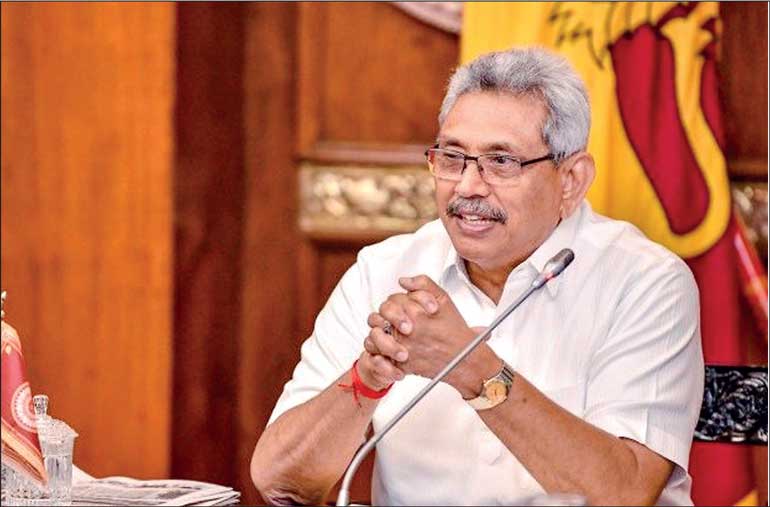Sunday Feb 15, 2026
Sunday Feb 15, 2026
Friday, 28 January 2022 00:15 - - {{hitsCtrl.values.hits}}

His lack of experience, ignorance, ethnic arrogance and authoritarian policies have deprived the ability to manage the crisis facing Sri Lanka prudently, thereby creating a situation leading to erupt it quickly
If Sri Lanka is compared to a ship, Gotabaya, the captain who navigates it can be considered to be a novice who has no experience at all about seafaring. He took the helm of the ship not when the sea was calm, but at a time when the ship had drifted away into a zone of extremely violent tempest, a situation generally avoided by seafarers.
was calm, but at a time when the ship had drifted away into a zone of extremely violent tempest, a situation generally avoided by seafarers.
Then he abstained from seeking advice of experienced people in propelling the ship out of the violent zone to a calm area; instead, he acted arbitrarily, causing it to drift deeper and deeper into the violent sea that it will not be easy to be hauled into the still zone whilst at the same subjecting both the vessel and the passengers on board into an inordinate devastation.
The captain of this unique ship is chosen by the vote of the passengers on board. Surprisingly, the passengers have elected a person who knew nothing about ships or seafaring, to steer the ship. The two main candidates who contested and lost the race are also on board. Due to the inability of taking the ship to a safe anchorage for an unusually long period of time, the passengers are catered not only with food but also the drinking water at an unusually high price and on a system of rationing designed to limit the quantity issued.
At the same time, the ship is running out of fuel. If the stock of fuel runs out completely, it will be impossible to get the ship out of the violent seas where the ships do not normally go into. The passengers of the ship are now in a desperate mood in which they are angry over the captain and fearful and sceptical about their future.
There is still a long way to go before the next captain is selected by a contest. There is no legitimate way to remove the captain in the interim unless he resigns himself. Both the main rivals of the captain seem to think that more the mistakes the incumbent captain makes the better it will be for their advantage. They seem to think that such a situation will make it easier for them to seize power at the next election; so much so, the two alternate leaders do not appear to have realised still that if the ship exhausts its stock of fuel completely losing its capacity to move away from the zone of rough seas, could cause great harm not only to the passengers but also to the ship itself. It can be said that this complex problem, which is not easy to solve, has become a puzzle that will determine the very existence of the country and its people.
Gotabaya’s fault
The biggest fault inherent in President Gotabaya, no matter how much popular support he enjoys as a ruler, is that he does not seem to know what he should avoid doing under any circumstance or committing them knowingly in violation of the accepted norms and principles. Withdrawal of more than 50 court cases pending against him and his key political colleagues is one example that can be cited for this. The release of a criminal convicted and was serving a prison sentence for a mass murder of Tamil people including a child is another example. The adoption of a policy that allows the family members and close friends to exploit the country to a maximum at a time of a prolonged pandemic situation and economic crisis is the third example.
The use of the Terrorist Investigation Division, the Police and the intelligence services to persecute minorities based on ethnicity and religiously divisive policy is the fourth example that can be cited in this respect. The fifth example is the refusal to take loan facilities from the International Monetary Fund to resolve the balance of payments crisis when the facility is readily available to do so. The sixth example is the foolish and destructive policy of banning the import of chemical fertilisers and chemical inputs used in agricultural crops and forcing the use of organic fertilisers instead.
Of all these misguided policies of the President, the methods such as the Terrorist Investigation Units, the intelligence services and the police used to inflict great terror in the minorities, degrade and deprive them of human respect and reduce them to a state of passive humility, submission can be described as inhuman, cruel, oppressive and sadistic measures. The horrible and ugly methods used in respect of Catholic protesters who demanded justice for the Easter attack and also the similar methods used to degrade the self-esteem of Muslims and Tamils in the north and turn them into cowardly and inactive communities have rendered it extremely difficult to rebuild the social system which is in a state of fragmentation and collapse.
The opposition Sinhala political parties in the south have hardly made strong protests against the misdemeanours being committed against minority ethnic and religious groups mentioned above. Perhaps, they may be doing so and remain tacit fearing that it might lead to the displeasure of the majority Sinhala Buddhist populace. This situation has increasingly led to widen the gap between the communities. Now the Tamils in the north are in a situation in which they do not trust any political party operating in the south.
The historic curse
This crisis cannot be considered as one that has been created by President Gotabaya. It can be described as a distinct crisis caused by the oppressive, destructive and predatory policies pursued by ruling parties that came to power from time to time since independence and particularly after the introduction of the presidential system of governance in 1978. Gota came to power at a time when the country was caught up in a whirlpool of this crisis.
The sudden outbreak of the corona pandemic also exacerbated the crisis. The country which he received to rule was not in good shape; it was on the verge of a catastrophic collapse. However, his lack of experience, ignorance, ethnic arrogance and authoritarian policies have deprived the ability to manage the crisis facing Sri Lanka prudently, thereby creating a situation leading to erupt it quickly.
The ugliest feature I perceive in the Gotabaya regime is the complete disregard for the duties ought to have been performed by a modern ruler. In that sense, even our ancient feudal monarchs were more civilised than Gotabaya. Wilhelm Geiger, in his book titled “Culture of Ceylon in Mediaeval Times”, provides an authentic description of how the oath taken by ancient kings at their coronation ceremonies had included the punishment that the nature will inflict upon the monarch when they failed in their duties as follows: “The entrance of a new sovereign upon his rights and duties was solemnised by a ceremony which used to be performed with greatest pomp. This was the abhiseka, the consecration or inauguration of the king, also called molimangala, feast of coronation…
“The ceremony took place we are told, in a hall constructed of udumbara wood (ficus glomerala). The Khattiya who was to be consecrated was sitting on a throne made of the same kind of wood. First, a maiden of the nobility (Khattiyakannaa) took with both hands a marine shell which was filled with water from the Ganges River and the spiral of which is wound to the right, poured water on the king’s head and said: Oh, Majesty, all the clans of the nobility make thee for their own protection and security by this consecration a consecrated king; rule thou with justice and peace persisting in the law, be thou one who has a compassionate heart towards those of the noble clans who are filled with sorrows about their sons and the like, and one who has a kind and peaceful and friendly heart and be thou guarded by their protection, defence and ward. Then the domestic chaplain (purohita) of the royal court attired in his richest apparel poured water on the king’s head from a silver shell with the same words only substituting ‘Brahman clans’ for noble clans. Finally, the foreman of the guilds (setthi) in his official garb performed the same ceremony for the householder clans (gahapati-gana) using a golden shell (ratana-sankha).”
Geiger then goes on to explain the meaning of the address of the three persons made to the king as follows: “According to the Tika, in the address of the three persons a curse is implied” What kind of a curse? In our language, it is like this: “If thou wilt rule in the manner as we said, well, but if thou dost not do so, thy head will split into seven pieces.” (Para 107 of the above book). This interpretation, I am of the view could still be applied to our Sinhala Buddhist presidents today.